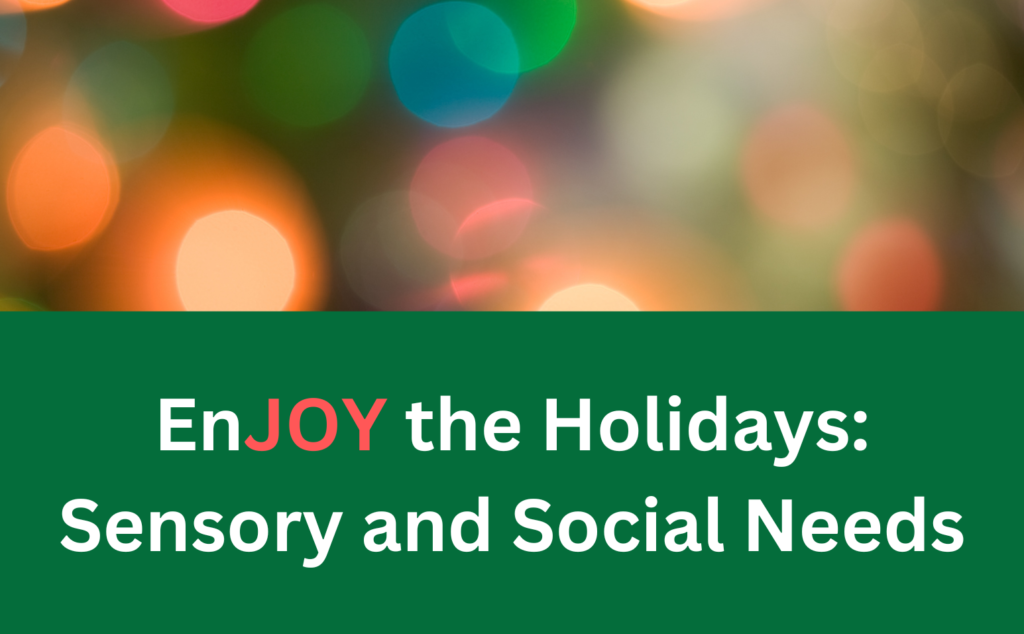SOCIAL EXPECTATIONS
When visiting with relatives and friends, there are multiple opportunities to practice greetings, conversations, game skills, and other social skills. Before going out to relatives’ and friends’ homes, role play what interactions could be like. Role play situations like greetings (make eye contact, smile, say hello). Act out walking up to the door, glancing towards the host, greeting politely, and smiling. Practice what your child could say during the meal, or after such as gratitude moments like “Thank you Grandma” or “the meal was delicious”.
Children learn best when they practice in natural environments, so role play ahead of time what expectations are, what the situation looks like, and what he/she can say to get him/her ready. Explain how long you expect to be there, and what will happen afterwards. Come up with a plan for if the child feels overwhelmed or uncomfortable. The child may want to bring a special object to hold in his/her/their pocket, or have an excuse to walk away from the group if it gets too noisy or chaotic sensory wise. These strategies will help the child to be more prepared to follow through during the actual event or opportunity.
When extended families gather, there may be different social expectations than in your daily life. For example, family members may expect your child to shake hands, accept hugs, etc. If a child has tactile sensitivities, or feels uncomfortable making physical contact, talk with him/her ahead of time to problem solve what he/she can do instead. Act out the situation with your child ahead of time to help them understand how to handle the situation, and to prevent unwanted reactions or uncomfortable moments. Prior to the event, talk to family members about your plan and advocate for your child. EnJOY the holidays while supporting your child in knowing about social expectations for the event or gathering.
ROUTINE
Knowing that schedules change to accommodate holiday events, try to keep a consistent schedule during the other times. Keeping your home routines (bed, meals, daily life) as consistent as possible provide your child with a base of stability. Then, when the unstructured things happen, your child will be more likely to roll with it. The less change the better. Up the amount of sleep your child can get, keep healthy foods and snacks available, and encourage extra water consumption. Use a calendar to visually show your child what is coming up in the weeks ahead. Keeping a routine will help you all to enjoy the holidays!
HEADS UP
When possible, give your child a heads up about the activity/event/occasion. If there’s a change in your daily routine (traveling to relative’s home or going to a holiday event), factually explain what it is, how long it will last, and when it will be over. Regardless of it being an exciting or nerve wracking event, giving the facts will give your child predictability and security. Let your child know how long the activity will last, and what will happen after the activity. Encourage your child with a preferred activity following the activity or event.
SIGHTS & SOUNDS
It can be surprising, exciting, and overwhelming when our neighborhood’s familiar stores get decorated with holiday items, moving snowmen, musical objects, and fancy lights.
Limiting the amount of time spent around these celebratory items can be helpful for children with sensory sensitivities. Even the sparkling lights and joyous songs in stores are alerting to sensory systems. Moderation is key. Even though they are exciting and children appear to enjoy them, being in stimulating environments can rev up a child’s sensory system, which may cause dysregulation and larger reactions. Keeping our children’s sensory systems in mind will help us all enJOY the holidays!
Learn more about sensory strategies with this video! Happy Holidays to you and yours.
For personalized and practical coaching for parents, families, educators, and children, reach out to Stacy Triplat Consulting.


